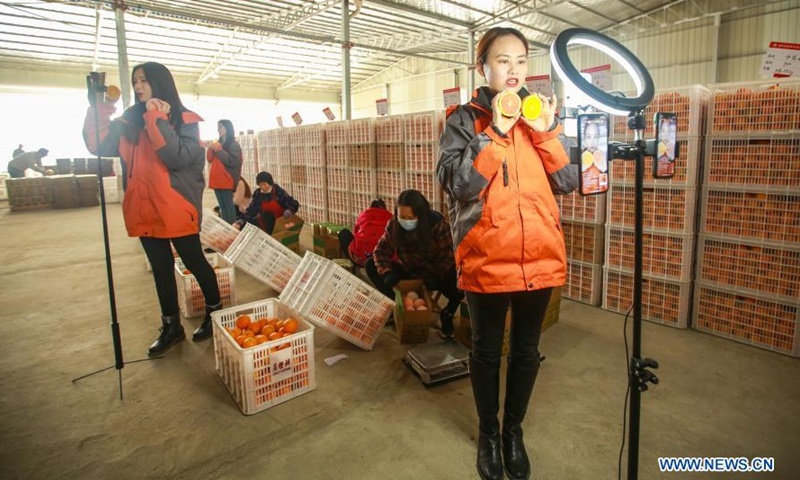
E-commerce livestreamers sell navel oranges through live-streaming platform in Zigui County, central China's Hubei Province, Dec. 5, 2020. The county has entered navel orange harvest season. (Photo: Xinhua)
The central government is rolling out more measures to curb the spread of the coronavirus during Spring Festival, traditionally a time of family reunion and mass migration.
Experts say this is essential to prevent a new outbreak, but it has also shattered many service industry firms' hopes of big profits after a difficult year.
One good aspect is that tech-savvy young consumers who are not returning to their hometowns for the holidays are releasing their purchasing power online, buying everything from half-prepared Spring Festival food to cleaning robots.
This shopping spree has offered a silver lining for China's first-quarter GDP, which some analysts worry could be lower than expected due to diminishing income for the services sector.
The State Council, the country's cabinet, released a notice on Monday saying that people in high-risk areas should stay in the places where they work and not return home, so as to minimize movement and prevent the spread of the virus.
People in medium-risk areas are asked to stay in their principle residence unless it's necessary to leave and those in low-risk areas are encouraged to stay in as well, read the notice.
Plane ticket prices for Spring Festival continued to drop amid the government's push for less travel during the holiday season. As of January 25, the average ticket price for the season was only 651.36 yuan ($100.59), the lowest in the last five years, online travel platform Qunar.com told the Global Times on Tuesday.
The Ministry of Transport forecast on January 20 that a total of 1.7 billion trips are expected to be made during the 2021 Spring Festival, down about 40 percent compared with 2019.
Spring Festival has an important impact on airlines' annual revenue. "For those years without COVID-19, during the 40-day Spring Festival, the overall passenger flight volume of the industry accounted for about 11.7 percent of the whole year, and revenue accounted for about 12.4 percent of the annual revenue," Lin Huaiyin, an analyst from CADAS, told the Global Times.
Lin predicted that the income of the airlines in this year's Spring Festival travel peak will be around 60 to 70 percent of that in 2020, and 30 to 40 percent of that in 2019.
The policy may also deliver a further blow to the country's catering and travel industry during what is supposed to be peak season, and its negative impact on consumption will further extend to following quarters of the year, Cao Yuanzheng, chief economist at Bank of China International, told the Global Times on Tuesday.
Cao warned that the impact on the catering industry may also linger for the rest of the year and further delay its recovery.
Nevertheless, amid the "new normal" of China's biggest festival, industry players have been seeing new kinds of consumption, which may compensate for the losses offline, industry players told the Global Times.
China's e-commerce giant Alibaba told the Global Times in a statement that the policy of reduced mobility has already promoted sales of products such as automatic noodle machines and other tech products.
E-commerce platform Suning said it will ensure its delivery workforce is adequate, and it has prepared special gift boxes for Spring Festival for those who cannot eat out.
Moreover, Chinese engineering and construction companies will face less disruption from the sporadic rise in COVID-19 cases in the first quarter than a year earlier when the pandemic began to spread across the country, Fitch Ratings said in a report it sent to the Global Times.
"We expect the recovery in business and construction activity to lead to strong first quarter year-on-year growth for the sector due to the low base and steady expansion in fixed-asset investment," read the report.


